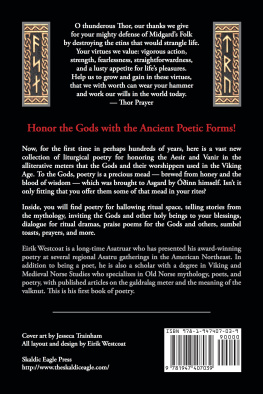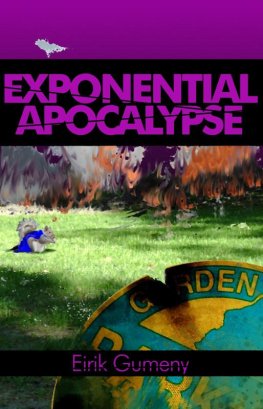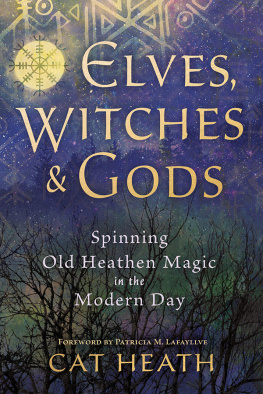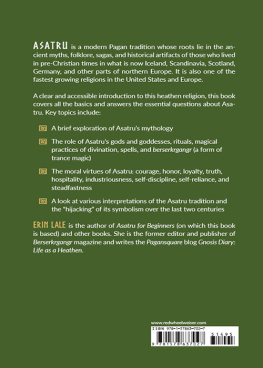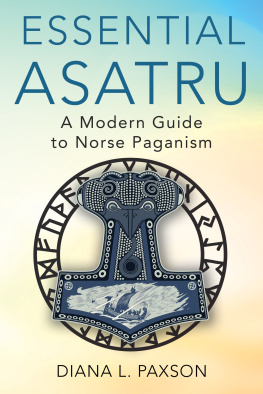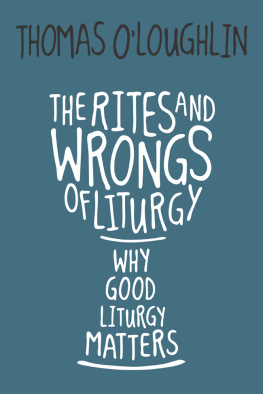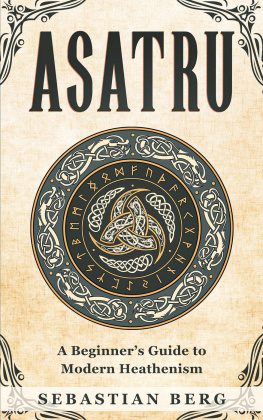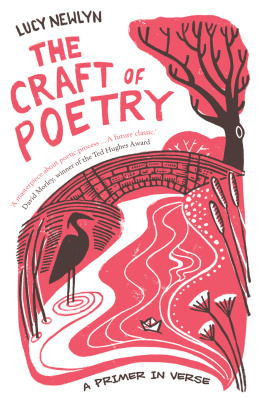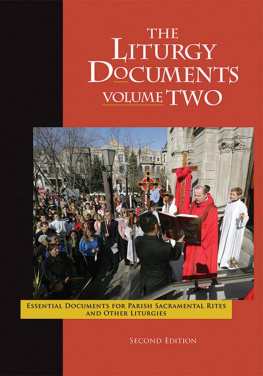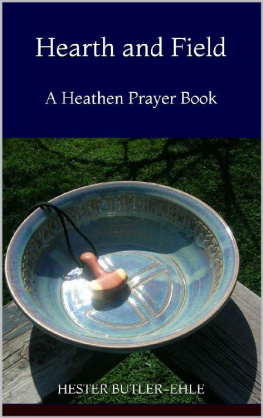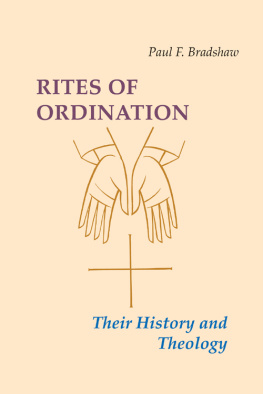Eirik Westcoat - Viking Poetry for Heathen Rites: Asatru Liturgy in Traditional Verse
Here you can read online Eirik Westcoat - Viking Poetry for Heathen Rites: Asatru Liturgy in Traditional Verse full text of the book (entire story) in english for free. Download pdf and epub, get meaning, cover and reviews about this ebook. year: 2017, publisher: Skaldic Eagle Press, genre: Detective and thriller. Description of the work, (preface) as well as reviews are available. Best literature library LitArk.com created for fans of good reading and offers a wide selection of genres:
Romance novel
Science fiction
Adventure
Detective
Science
History
Home and family
Prose
Art
Politics
Computer
Non-fiction
Religion
Business
Children
Humor
Choose a favorite category and find really read worthwhile books. Enjoy immersion in the world of imagination, feel the emotions of the characters or learn something new for yourself, make an fascinating discovery.
- Book:Viking Poetry for Heathen Rites: Asatru Liturgy in Traditional Verse
- Author:
- Publisher:Skaldic Eagle Press
- Genre:
- Year:2017
- Rating:5 / 5
- Favourites:Add to favourites
- Your mark:
- 100
- 1
- 2
- 3
- 4
- 5
Viking Poetry for Heathen Rites: Asatru Liturgy in Traditional Verse: summary, description and annotation
We offer to read an annotation, description, summary or preface (depends on what the author of the book "Viking Poetry for Heathen Rites: Asatru Liturgy in Traditional Verse" wrote himself). If you haven't found the necessary information about the book — write in the comments, we will try to find it.
Eirik Westcoat: author's other books
Who wrote Viking Poetry for Heathen Rites: Asatru Liturgy in Traditional Verse? Find out the surname, the name of the author of the book and a list of all author's works by series.
Viking Poetry for Heathen Rites: Asatru Liturgy in Traditional Verse — read online for free the complete book (whole text) full work
Below is the text of the book, divided by pages. System saving the place of the last page read, allows you to conveniently read the book "Viking Poetry for Heathen Rites: Asatru Liturgy in Traditional Verse" online for free, without having to search again every time where you left off. Put a bookmark, and you can go to the page where you finished reading at any time.
Font size:
Interval:
Bookmark:
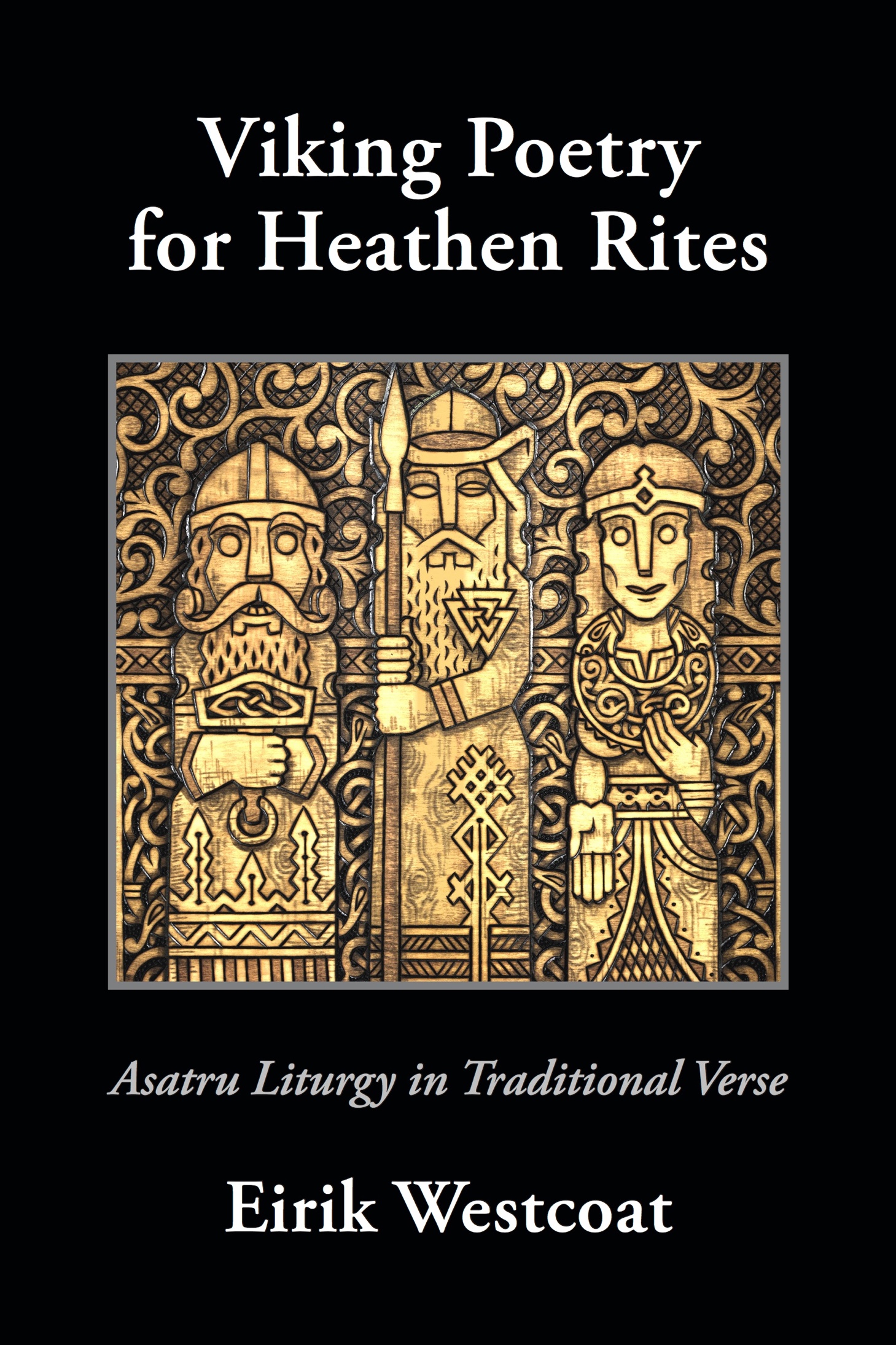
Drekktu djpt inn dra mj!
Viking Poetry
for Heathen Rites
Asatru Liturgy in Traditional Verse
Eirik Westcoat
Skaldic Eagle Press
Long Branch, Pennsylvania
2017
Copyright 2017 Eirik Westcoat
With proper attribution (for example, verbally or in a program booklet), the poems in this book may be freely read out loud (with or without minor changes) in not-for-profit religious rituals or poetry readings, whether private or public. All other rights reserved.
For permissions or other information, please contact
the author at
or .
Cover art by Jesseca Trainham
All layout and design by Eirik Westcoat
First Edition, Midsummer 2017
9 8 7 6 5 4 3 2 1
Casewrap Hardcover ISBN: 978-1-947407-00-8
Trade Paperback ISBN: 978-1-947407-01-5
PDF Ebook ISBN: 978-1-947407-02-2
EPUB Ebook ISBN: 978-1-947407-03-9
Kindle Ebook ISBN: 978-1-947407-04-6
Skaldic Eagle Press
Long Branch, Pennsylvania
For the Hearth of Yggdrasil
The idea for this book was one of the earliest inspirations I received from the Mead of Poetry. It has been a long road to its completion, and many deserve thanks for their active help with it or for contributing to the conditions that allowed it to grow.
First and foremost, my thanks go to the Hearth of Yggdrasil, to whom this book is dedicated. They supported my development as a poet during its earliest days, and many of the poems in this book were first recited in their rituals or other events. The development of a liturgy must have a religious community as its context, and without the Hearth of Yggdrasil, I might not have had that context, and this book would likely have been quite different.
Next, thanks go to the Rune-Gild, that august initiatory school, which enabled me to make the self-transformation necessary to becoming the skald and scholar that I am today, and whose curriculum lead me to encounter the Mead of Poetry. This book comprises the largest part of my Masterwork with them. Great credit also goes to the East Coast Thing, for the spark via a lore contest that got me started on writing poetry in late 2010, and for the reception it has given to my poetry there in the years afterwards, both in its skaldic competition and outside of it.
Thanks also go to Jesseca Trainham for her wonderful cover art and to Laura Kemmerer for copyediting the text and to Scott Mohnkern for further proofreading. Furthermore, I thank my family for supporting my endeavors over the years, but most especially my mother, Janet Westcoat, for support in publishing this book and my brother, Jeffrey Sigurd Westcoat, for offering feedback on many of my poems.
Finally, thanks go to the gods, the Aesir and Vanir, but most especially to inn, Bragi, Kvasir, Varr, Freyja, and Thor for their inspiration.
This book is an effort to restore the ancient meters and forms so that they can live again and fulfill their traditional purposes again. It is also a challenge, one that declares that the dead end of modern free verse doesnt have to be the end of poetry, that the way forward is by a return to tradition.
The poems in this book fulfill that mission by leading through example. True to its name, the majority of poems in this collection were written for use in many different parts of heathen ritual. Among other things, the poems here hallow space, call to the gods, memorialize heroes and ancestors, give praise, and bring the power of ritual to everyday life. They educate, inspire, and help one align with higher principles.
Many of these Viking poems have previously appeared on my blog (The Skaldic Eagle at press time, formerly called Eirik Westcoat, Skald), but I wont attempt to recount their original appearances there. Other poems have been published elsewhere, and these I will recount. fundarml first appeared in Idunna 96 (Summer 2013). A Tale of Wisdoms Well first appeared in Idunna 97 (Autumn 2013). Three of the poems have won victory in skaldic competitions at the annual East Coast Thing: The Six Treasures in 2011, Yggdrasilsdrpa in 2012, and A Tale of Wisdoms Well in 2013.
This book is laid out with the following structure. First, there is an introduction to the meters that I use, followed by a section on the types of poems, so that the poems can then be read uninterrupted in the main text as follows:
Chapter 1 presents short pieces that can be used for hallowing and warding ritual space through various means.
Chapter 2 features poetic retellings of prose tales, most of which appeared in Snorris Prose Edda but did not have counterparts in the Poetic Edda . My award-winning poem, The Six Treasures, is in this chapter.
Chapter 3 features a nearly exhaustive set of two-stanza calls to many gods and heroes, ideal for ritual use.
Chapter 4 contains longer calls to inn, Freyja, and Thor.
Chapter 5 contains three ritual dramas dialogue only, youll need to supply stage directions for performance.
Chapter 6 demonstrates another function of the ancient skald formal praise poems to those who deserve them. My two other award-winning poems, Yggdrasilsdrpa and A Tale of Wisdoms Well, are in this chapter. Thor Processional Chant debuted at East Coast Thing 2016, with music developed by Josh Rood. (These first six chapters are roughly in the order that they might be used in a heathen blessing.)
Chapter 7 is similar, except these are short pieces written as sumbel toasts to gods, ancestors, heroes, and other wights.
Chapter 8 also contains sumbel toasts, except these were written and recited as sequences presented over the three rounds of a heathen sumbel.
Chapter 9 is something unusual for heathenry: prayers to the gods.
Chapter 10 presents various short charms for waking, eating, sleeping, and similar for use in daily life.
Chapter 11 finishes the book with various heathen-related poetry that didnt fit elsewhere.
Many of the poems, especially those in chapters 2 and 6, are lengthy enough to stand on their own and be recited in a hall or around a campfire to entertain or inspire an audience. They were written to be heard! Of course, I cant put a live campfire performance in a book. However, Im doing the next best thing: offering quality digital audio recordings of many of the poems look for them available separately.
In addition to poetry that you can recite in your own rituals, you will find beauty, inspiration, lore, and more in these pages. Through poetry, rrir returns to Midgard for both Ash and Elm.
A brief explanation of the meters I have used is in order, although this is not the place for going into exhaustive detail on how to write modern English versions of the ancient meters. Also, keep in mind that these are modern English versions. They are not and do not purport to be clones of the Old Norse or Old English versions, as such a thing is neither possible nor desirable due to the differences in the languages. Additionally, many of my poems may show some intricacies that arent described here.
Fornyr islag . This is the simplest of the meters and is easily recognized in this book by the eight-line stanzas of the poems that use it. I use it quite frequently. It is based on the elder form of the same name, a name which roughly means meter of ancient words. This is the form used by many of the poems of the Poetic Edda (such as V lusp and Th rymskvi a ), and is also the form that Tolkien used in The Legend of Sigurd and Gudrun . Each line contains two fully stressed syllables and generally a minimum of four syllables overall. (Some of my older poems will have three-syllable lines.) The first stress of the second line of each pair must alliterate with either, or both, of the stresses in the first line of the pair. The second stress of the second line must not alliterate with the first stress of the second line but may optionally alliterate with one of the stresses in the first line. Unstressed syllables are not counted for alliteration purposes, and the number of them in each line is usually two to four but can be more or less than that. All vowels are considered to alliterate with each other. Inspired by Old Norse and Old English practice, I treat the consonant clusters sk , sp , st , and sh as only alliterating with themselves, not with each other or with s by itself. Here is an example of two lines of fornyr islag from my poem Heathen Pride:
Font size:
Interval:
Bookmark:
Similar books «Viking Poetry for Heathen Rites: Asatru Liturgy in Traditional Verse»
Look at similar books to Viking Poetry for Heathen Rites: Asatru Liturgy in Traditional Verse. We have selected literature similar in name and meaning in the hope of providing readers with more options to find new, interesting, not yet read works.
Discussion, reviews of the book Viking Poetry for Heathen Rites: Asatru Liturgy in Traditional Verse and just readers' own opinions. Leave your comments, write what you think about the work, its meaning or the main characters. Specify what exactly you liked and what you didn't like, and why you think so.

